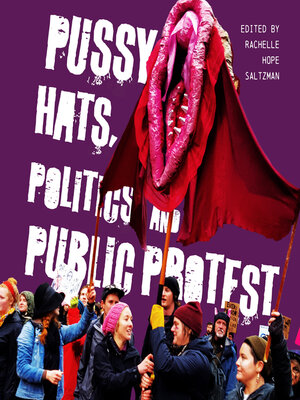
Sign up to save your library
With an OverDrive account, you can save your favorite libraries for at-a-glance information about availability. Find out more about OverDrive accounts.
Find this title in Libby, the library reading app by OverDrive.



Search for a digital library with this title
Title found at these libraries:
| Library Name | Distance |
|---|---|
| Loading... |
Co-winner of the 2021 Elli Köngäs-Maranda Prize awarded by the Women's Section of the American Folklore Society
Contributions by Susan Eleuterio, Andrea Glass, Rachelle Hope Saltzman, Jack Santino, Patricia E. Sawin, and Adam Zolkover
The 2016 US presidential campaign and its aftermath provoked an array of protests notable for their use of humor, puns, memes, and graphic language. During the campaign, a video surfaced of then-candidate Donald Trump's lewd use of the word "pussy"; in response, many women have made the issue and the term central to the public debate about women's bodies and their political, social, and economic rights. Focusing on the women-centered aspects of the protests that started with the 2017 Women's March, Pussy Hats, Politics, and Public Protest deals with the very public nature of that surprising, grassroots spectacle and explores the relationship between the personal and the political in the protests.
Contributors to this edited collection use a folkloristic lens to engage with the signs, memes, handmade pussy hats, and other items of material culture that proliferated during the march and in subsequent public protests. Contributors explore how this march and others throughout history have employed the social critique functions and features of carnival to stage public protests; how different generations interacted and acted in the march; how perspectives on inclusion and citizenship influenced and motivated participation; how women-owned businesses and their dedicated patrons interacted with the election, the march, and subsequent protests; how popular belief affects actions and reactions, regardless of some objective notion of truth; and how traditionally female crafts and gifting behavior strengthened and united those involved in the march.
Contributions by Susan Eleuterio, Andrea Glass, Rachelle Hope Saltzman, Jack Santino, Patricia E. Sawin, and Adam Zolkover
The 2016 US presidential campaign and its aftermath provoked an array of protests notable for their use of humor, puns, memes, and graphic language. During the campaign, a video surfaced of then-candidate Donald Trump's lewd use of the word "pussy"; in response, many women have made the issue and the term central to the public debate about women's bodies and their political, social, and economic rights. Focusing on the women-centered aspects of the protests that started with the 2017 Women's March, Pussy Hats, Politics, and Public Protest deals with the very public nature of that surprising, grassroots spectacle and explores the relationship between the personal and the political in the protests.
Contributors to this edited collection use a folkloristic lens to engage with the signs, memes, handmade pussy hats, and other items of material culture that proliferated during the march and in subsequent public protests. Contributors explore how this march and others throughout history have employed the social critique functions and features of carnival to stage public protests; how different generations interacted and acted in the march; how perspectives on inclusion and citizenship influenced and motivated participation; how women-owned businesses and their dedicated patrons interacted with the election, the march, and subsequent protests; how popular belief affects actions and reactions, regardless of some objective notion of truth; and how traditionally female crafts and gifting behavior strengthened and united those involved in the march.







